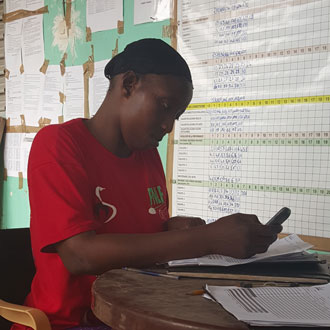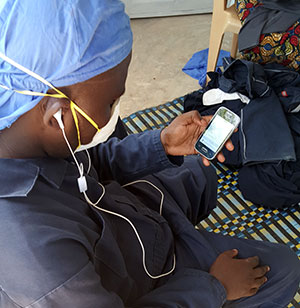The U.S. President’s Malaria Initiative (PMI) Africa Indoor Residual Spraying (AIRS) Project protects millions of people in Africa from malaria by spraying insecticide on the walls, ceilings, and other indoor resting places of mosquitoes that transmit malaria. The PMI AIRS Project implements indoor residual spraying (IRS) campaigns in 11 countries in Africa. These campaigns focus on operations, environmental compliance, monitoring and evaluation, entomological monitoring, and information, education and communication.
Traditionally, implementation of these components relied on paper-based processes due to a lack of good technological infrastructure, low exposure to technology in rural areas, and high equipment costs typical of countries where implementation occurs. However, as equipment costs drop and telecommunication providers strengthen infrastructure, the possibility of moving away from paper-based systems has increased. For example, as of 2014, 78 percent of mobile phone consumers worldwide reside in low-income developing countries.1 The PMI AIRS Project is finding innovative ways to incorporate technology to increase efficiency, reduce the time lag between managerial decision making and implementation, as well as decrease bottlenecks related to administrative processes.
Mobile Payments for Seasonal Workers
One of the biggest challenges of IRS campaigns is the payment of thousands of spray operators and other seasonal workers. Organizing bi-weekly payments using conventional banking methods in Africa is cumbersome due to the lack of sufficient banking services in the often remote rural settings of spray campaigns. To overcome these challenges, The PMI AIRS Project started paying spray operators via their cell phones.
Six PMI AIRS country programs (Ghana, Madagascar, Mali, Senegal, Zambia, and Zimbabwe) use mobile money payments. These programs worked with the local telecom provider to: create a record of all spray operators’ mobile money account numbers, establish a transfer schedule with predetermined transfer amounts, and ensure that mobile money agents had enough cash to support such an influx of mobile customers demanding payment.
This innovation produced several positive results:
- Significantly reduced the security risk of sending staff into the field with large amounts of cash;
- Significantly reduced the cost of transacting the payment; for example, in 2013, AIRS Madagascar realized a 78 percent cost savings over 2012, when it used finance assistants to distribute cash payments;
- Established regular, on-time payments to seasonal workers, which both motivated the workers and eliminated the risk of work stoppages when payments were delayed.
Performance Monitoring for Real-Time Management
.
In the past, the PMI AIRS Project tracked operational performance using a paper-based system to collect performance data at every operational site. The paper-based Spray Performance Tracker (SPT) was filled out by team leaders by hand every day. The country program’s operations manager would have to call each site individually to collect key data from the SPT and enter them into a central Excel spreadsheet at the end of a day. This process was laborious and limiting, since some sites were sometimes unable to be reached on a daily basis.
In 2014, in collaboration with the technology partner Dimagi Inc., two PMI AIRS countries piloted the use of a Short Messaging Service (SMS) based system to send these data via basic cell phones. This system was then rolled out in six countries in 2015. The SMS system digitized the SPT and developed the Performance Management Tracker (PMT). The PMT utilized Dimagi’s open-source cloud service, CommCare, to compile incoming SMS data and create daily performance reports that were sent to PMI AIRS program managers, both in the field and home office. The reports aggregated four performance indicators across all operational sites and allowed managers to understand how teams were performing as compared to the predetermined schedules and specific targets.
The results for the SMS tool include:
- The data are used to more carefully follow performance and monitor the use of insecticide;
- The SMS tool’s built-in logic checks decrease the number of errors in submitted data;
- Immediate access to operational data expedites corrective actions and improvements that should be done in the field based on incoming data.
Smartphone-based Supervision to Increase Operational Compliance
Supervision of IRS campaigns is vitally important for maintaining safe and effective spray performance. Supervisors used to collect data on paper forms – on topics such as spray preparations, spray technique, and stockroom performance – to manage environmental compliance and spray operations. However, the use of paper forms had several problems, including data reporting errors. Challenges to promptly submit the forms prevented the country team from processing and sharing information in real time, and efficiently identifying and correcting systemic shortcomings.
Together with Dimagi Inc, the PMI AIRS Project adapted the paper supervisory forms into a mobile application. At the end of each spray day, government and project supervisors in the field use the application to complete and submit their forms to a cloud-based open-source platform. This data is then sent via email to all supervisory staff to allow them to take corrective measures the following morning during spray team preparation.
Specific results for the Mobile Supervisory Application Include:
- Ownership by government and PMI AIRS country program supervisory staff of the use of supervisory tools;
- Government supervisors are empowered through the use of the automated, user-friendly job aid to do their jobs effectively.
- Improved campaign management from site to the central level, as a result of immediate actions to address deficiencies found with the supervisory tool from the real-time field data.
The PMI AIRS Project will continue to support these effective digital solutions while evaluating other opportunities to use technology. The goal of any new digital intervention will be to enhance the operations in an effective, digitalized way. Further implementation of such solutions will focus on analyzing cost as well.
1 International Telecommunication Union (ICT). ICT Facts and Findings April 2014. ICT Data and Statistics Division Telecommunication Development Bureau.
This story was taken from www.africairs.net.
Annual Report
.png?sfvrsn=2)
Read the PMI Fourteenth Annual Report [PDF, 14.2MB]



